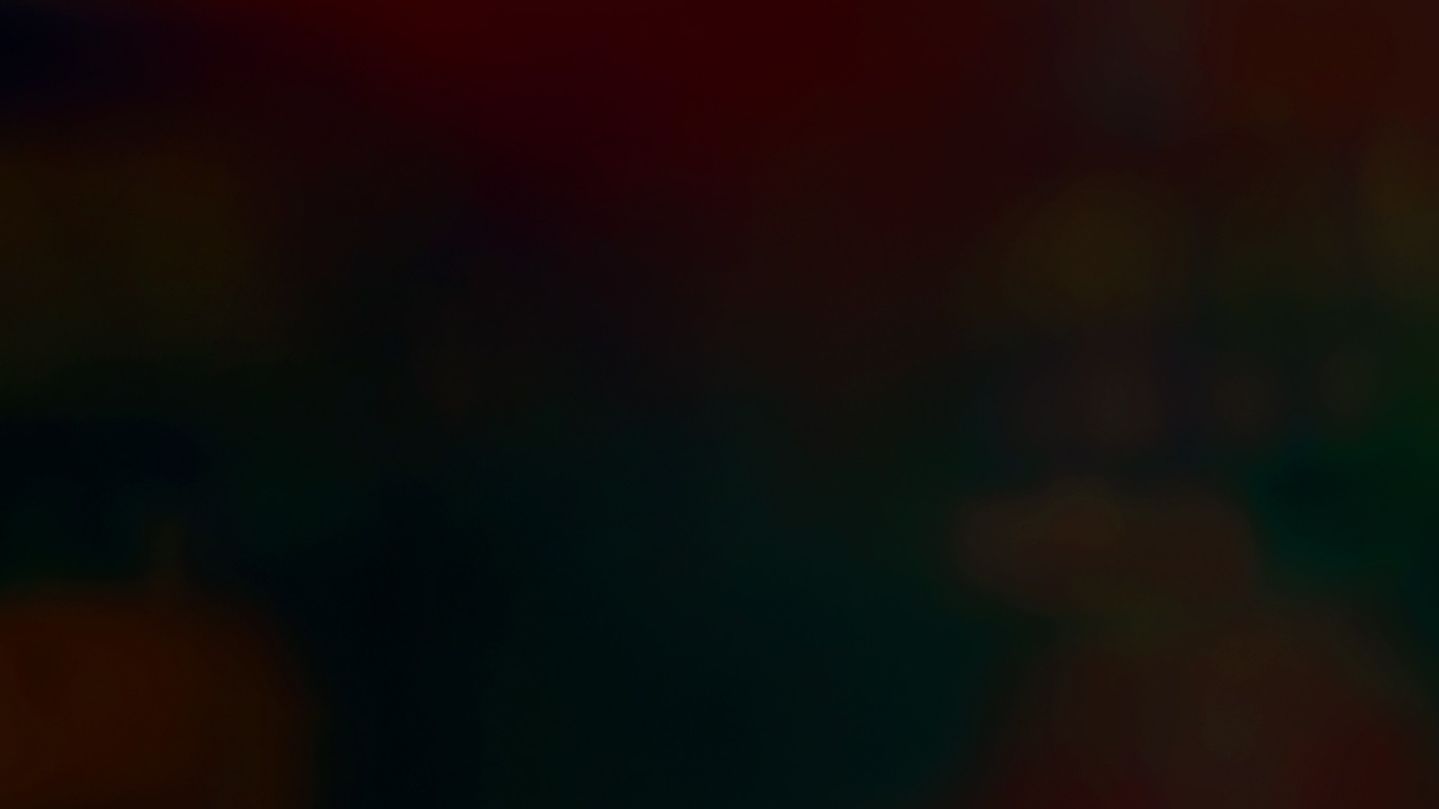Story highlights
Atita Verghese is India's first female professional skateboarder
She teaches children to skate and also volunteers to build skate parks
She founded Girl Skate India, a collective that aims to inspire more women to pick up the sport
When Atita Verghese stepped on a skateboard for the first time, it wasn’t her own.
She’d been loaned the board from a male friend. That gesture, she says, was the most pivotal moment of her life so far, guiding her towards a ground-breaking career as India’s first professional female skateboarder.
“I felt like nothing existed outside of that skate park,” the 23-year-old skater tells CNN. “That moment I had – it was perfect.”
In 2015, she co-founded Girl Skate India, an initiative that teaches girls how to skate, promotes gender equality and brings together skateboarders in India through workshops.
At the end of 2015, the group organized 12 skaters from nine countries to embark on an all-female four-city skate tour – the first in India – using the sport to empower underprivileged girls around the country.
If anyone is an advert for the power of the skateboard, it’s Verghese.
Rebel with a cause
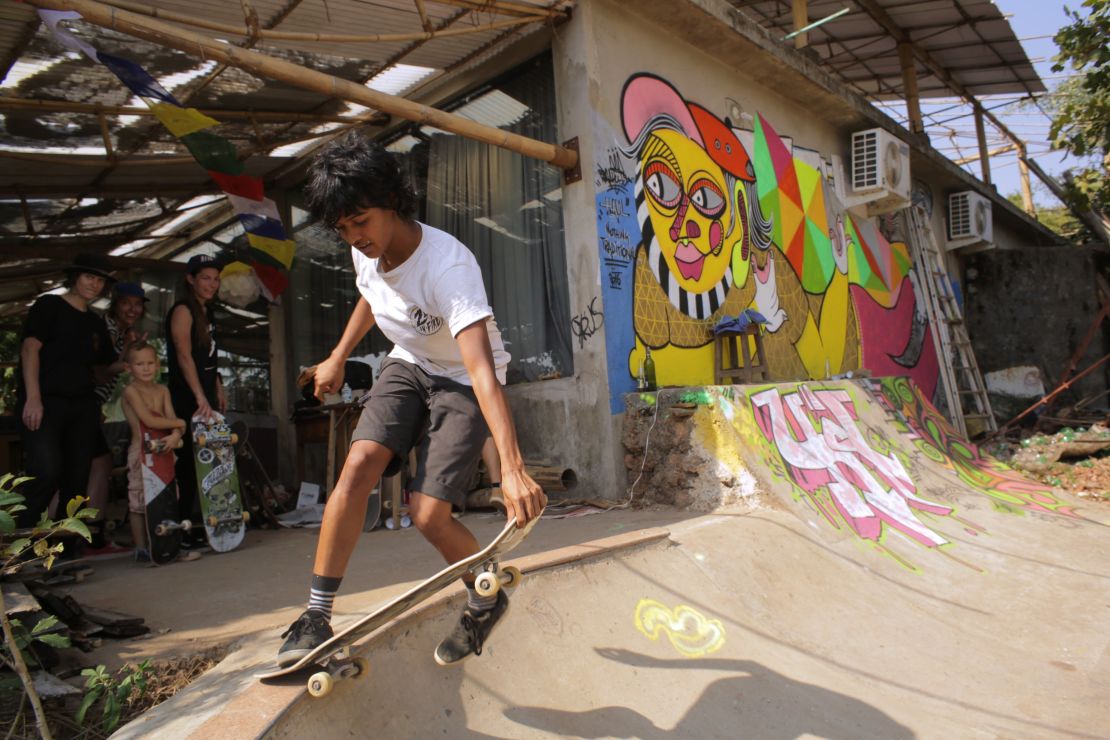
Growing up in Bangalore, Verghese had a strong female role model in her mother, Nalini.
After Verghese’s father passed away when she was eight years old, Nalini became the breadwinner, running a guesthouse and bringing up her two daughters alone.
Rebellion against social norms was in Verghese’s DNA.
Before Verghese was born, her mother – a non-Muslim – was attacked with acid by strangers for wearing Western-style clothes, in the small village of Hassan, in southwest India, where she lived.
“The only explanation was that (the perpetrators) got annoyed by what she was wearing,” Verghese says. Nalini preferred shorts and skirts to saris. Women, back then, were expected to wear “modest” traditional outfits, Verghese says.
“She was known mostly to be seen mostly in Western outfits that were sometimes too much for the villagers to handle, apparently,” Verghese explains, adding that the attack took place in “a village that was way more closed-minded than Bangalore city.”
Miraculously, Nalini escaped without any scarring, but the perpetrators were never caught.
“She was really lucky,” says Verghese, “but her clothes were burnt.”
Verghese also didn’t conform to her conservative society’s ideas of how a girl should act.
“Growing up, I played football, basketball, hockey. I swam. I also did long-jump – all of it,” she tells CNN.
“I didn’t study or get the best grades in school. I was always getting in trouble. I was doing a lot of pranks and things. They would expect that from the boys – none of the girls were doing things like that.”
Her teachers warned that she would become a failure if she continued acting this way, she says.
Verghese didn’t let their opinions hold her back.
Welcome to the skate park
It wasn’t until 2013, when Verghese was 19, that she got on a skateboard – a sport that has only started to gain popularity in India during the past decade.
It was friend Abhishek Shakenbake who introduced her to the sport in a skate park in Bangalore, where they are both based.
“He would meet me (after school) with a skateboard,” Verghese remembers. “I was really curious and was like, ‘What is it?’” He taught her “a few of the basics.”
A self-taught skateboarder who picked up the sport in 2010 after a law school classmate brought him a skateboard from overseas, Abhishek, now aged 31, co-founded HolyStoked Collective in 2011. It went on to become one of the biggest skate shops in Bangalore.
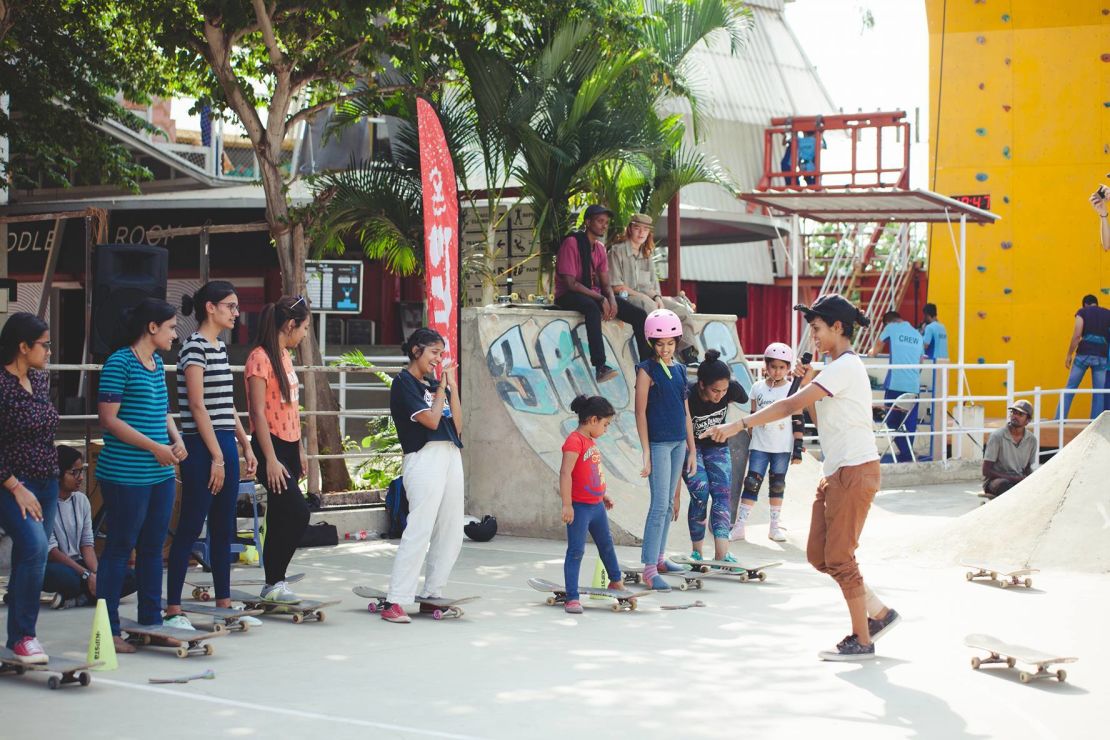
“(Skating) was kind of an outlet for most of us,” Abhishek tells CNN.
“We didn’t all have skateboards, but there were more of us coming together to skate – so we decided to start a crew to … find a solution for problems like (lack of) space and equipment.
“Back in 2010, there must have been, like, six people who were skating in India, according to our (Abhishek and his fellow skaters) research. We found maybe only two other people who were skating before us.”
‘I just wanted some girl power’
Verghese turned out to be a quick learner. But still without her own board, she had to wait for other skaters at the park to take breaks, then ask to borrow theirs.
Towards the end of 2013, Abhishek had a surplus of skateboards and was gifting them to those he thought had a serious interest in the sport – Verghese was selected.
Back then, the skatepark was a male-dominated realm, but Verghese says no one has ever asked her why she was there. It was perhaps obvious that she was in her element.
Two other girls came along “for a short time” before dropping out, she says.
Not content with just skateboarding for fun, Verghese started working with HolyStoked, organizing skateboarding classes for youngsters in Bangalore. But she wanted to put together events in other regions to get more people into the sport.
In 2014, Lisa Jacob, a Paris-based skateboarder, traveled to India and was advised by friends in the skateboarding world to get in touch with Verghese.
At the time, Verghese was in Kovalam, Kerala, building a skate park with Sebastian Indian Social Projects (SISP), a local NGO that uses skateboarding and surfing as incentives to get disadvantaged children who have dropped out of school back into the classroom.
Jacob, along with Netherlands-based skateboarder Louisa Menke, joined Verghese on the project.
“Lisa’s been in the skateboard scene for about 20 years now, so she knows a lot of people,” explains Verghese. “We were talking about what we could do to kick off the scene a little bit (in India).”
In 2015, Girl Skate India – an international collective of female skaters who engage with underprivileged youngsters through skating – was born.
In December that year, the group put on the first ever tour of female skaters across India, featuring 12 women from nine countries.
Skaters on the tour included Chloé Bernard of Marseilles, France; Monica Shaw of Melbourne, Australia; Berlin-based Linda Ritterhof of Germany; and Roxana Cernicky of Liege, Belgium.
The project was entirely self-funded. “Everyone took care of themselves,” Verghese says.
The group traveled to Kovalam, Bangalore, Goa and Hampi, where they put on skate workshops and skate yoga lessons, as well as built ramps.
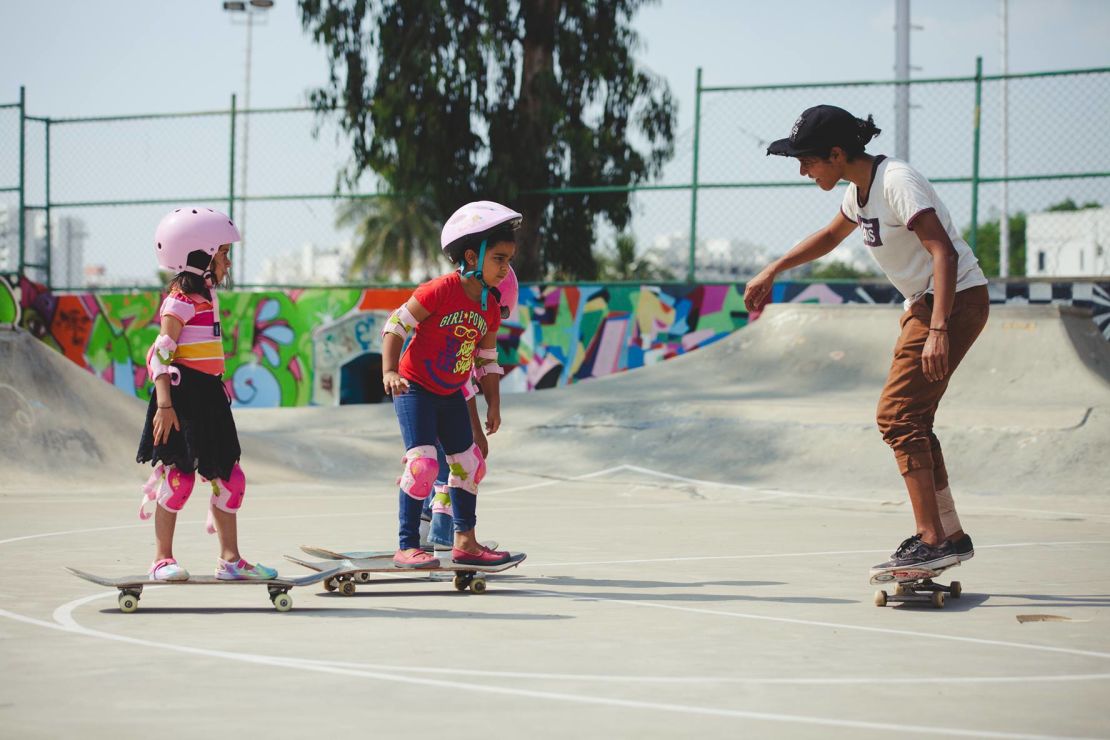
“I learned how to use the tools and how long to wait for the concrete and the different steps that go into actually building a concrete skate park,” she explains. “After that there was a whole fire spreading across the country because people just wanted to build more and more.”
For Verghese, forming the collective came from a desire to motivate women to pick up skateboarding – but that was not all.
“I wanted to skate with girls, honestly. It was selfish,” she admits.
“I just needed some girl power in this part of the world, where there’s hardly any of that. I wanted more girls to come skate, and spread the word so that hopefully it would get other girls interested.”
The beginning of a movement
After the tour wrapped up in January 2016, Verghese, then 22 years old, had become a well-known face on the international skateboarding circuit.
But it wasn’t because she was taking part in competitions, of which there are “hardly any” in India, she says.
“I guess the skate world is really small … so if you do something that stands out, you get noticed,” she says. “For me, I think this tour kicked things off faster and (gave me) a wider reach, as there were people from nine different countries on it.
“(People) absolutely loved what I did. I was shocked … I didn’t know how big it was going to end up being.”
Girl Skate India put out a short film about their work, which ended up being shown in 20 locations worldwide.
“Something special was happening,” she says. “I think it was important to show the rest of the community what we were doing, because otherwise they wouldn’t know.”
Today, Verghese works with various organizations all over the world as a volunteer, including international non-profit Make Life Skate Life, which has built free skate parks in Bolivia, Jordan, Ethiopia, and Myanmar, as well as India, and Janwaar Castle, which aims to unite children and break the caste system in India through skateboarding.
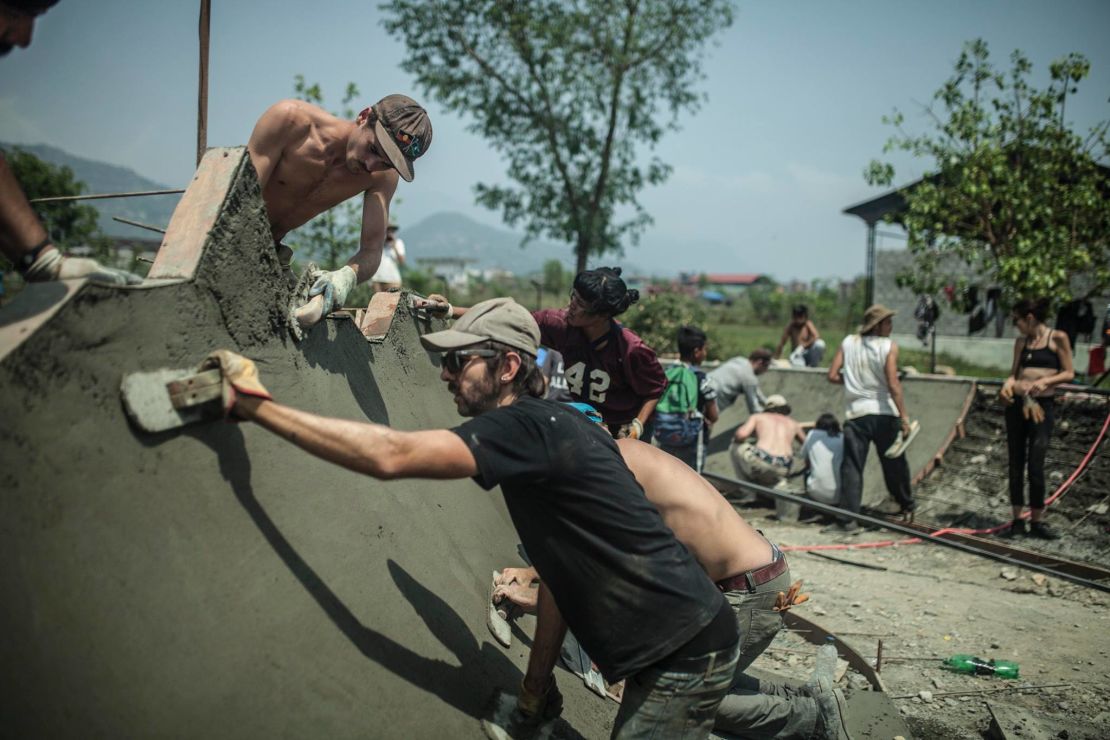
To date, she has helped build four skate parks in India, as well as one in Belgium. HolyStoked as a collective has built around 10.
As her reputation has grown, she has worked as a skate stunt double in commercials and appeared in UK rock band Wild Beasts’ “Alpha Female” music video. In 2016 Vans India became her sponsor; others include UK-based sports company Extreme, and US brand Stanley Tools.
Although she’s often referred to as India’s first female professional skater, Verghese says that she’s not quite on pro level outside of the country.
“It’s quite different when it comes to India and the rest of the world. I don’t know if I would say that on an international level I’m a pro-skater, because that would mean you either get your own deck model, or your own shoe model.”
A growing scene
Whether she’s an international pro-skater or not, the difference Verghese has made to the skateboarding scene in India is undeniable.
“It’s great Atita is doing this, not just skating for herself, but taking it forward, trying to put it out there,” Abhishek says.
“So many girls have been getting into skateboarding during the past couple of years. I would say a lot of them might have been inspired by seeing her, the work she’s done.”
“In India, they need that. They need to see other girls succeed.”
Abhishek acknowledges that India can still be a frustrating place for women. Skateboarding, he says, can be a way “to channel this angst that you have in a positive way.”
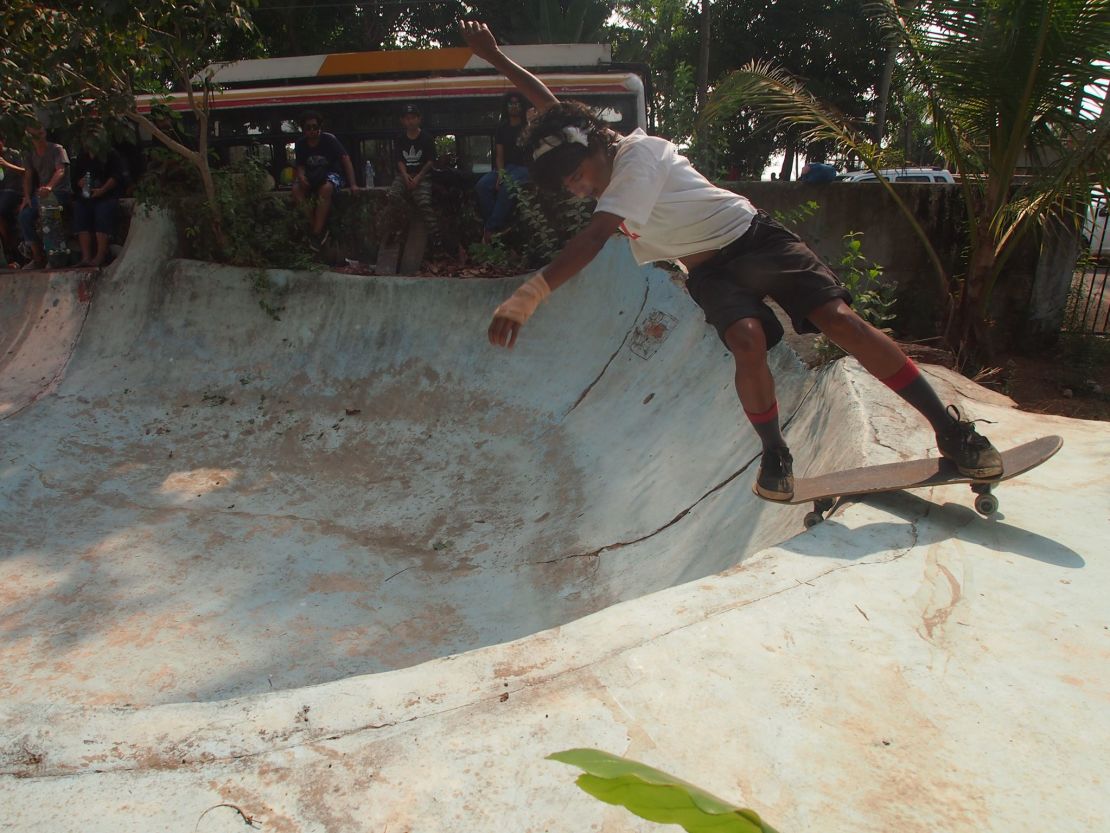
Because skateboarding is such a new sport, he also feels it has given Verghese, and other women, a chance to make it their own, before society creates gender-based stereotypes around it.
“In India, if a girl goes ahead and does something which she’s not supposed to – in terms of what social norms dictate – automatically there’s a bunch of people who get offended and (say) ‘This is not our culture,’” Abhishek says.
“But with skateboarding, it’s something new. Either way, it’s not our culture,” he adds.
Verghese agrees it’s a blank canvas.
“In the US, for example, people think skateboarders are rebels. If they’re in the skate park they’re up to no good,” she says. “These things (stereotypes), they don’t really exist (in India), because the scene is really new.”
For her part, Verghese has used skateboarding as a chance to embrace a different female identity – one that has allowed her to cut her hair short, have facial piercings and wear clothes that are not typically feminine.
Like her mother, she is challenging female stereotypes.
“Yes, it strays from the typical ideal of femininity,” she says of her look. “Many people were confused looking at me when I had shorter hair, (and were) unsure of my gender when they’d see me skate.”
